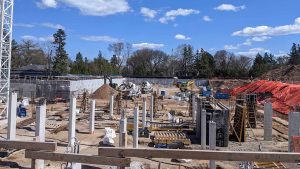The City of Toronto is planning to undertake road construction on a 24-hour, seven days a week basis, in order to speed up completion and reduce traffic congestion, with the first projects scheduled for 2015.
"In 2015, Engineering Construction Services (ECS) is looking at implementing various measures to mitigate traffic disruption related to city construction projects," said Frank Clarizio, City of Toronto director of design and construction transportation infrastructure.
"We are expanding the number of major road rehabilitation projects being delivered during the overnight period from 7 p.m. to 5 p.m. This year, we are looking at opportunities to implement four major road rehabilitation projects over night and are still investigating which roads these might be."
Clarizio made this statement in a presentation at the recent Ontario Road Builders’ Association’s convention in Toronto.
On the same day, Toronto city council was in the process of adopting a motion to implement a series of measures designed to speed up major road-construction projects and unlock traffic congestion.
One of the measures adopted by council is to undertake overnight work on major roads that are not in close proximity to residential areas. This would allow the road to remain open and free during the day. The overnight work would take place from 7 p.m. to 5 p.m. six days a week.
"We are also looking at expanding the number of projects that would be implemented in a 24/7 operation in an effort to accelerate work," said Clarizio.
"We did a couple last year and in 2015 we are planning to put out tenders for two or three 24/7 operations work."
This measure involves allowing construction work to take place 24 hours a day and seven days per week for expressways, major roads that are not close to residential areas and major roads where the project would be disruptive to TTC streetcar service.
"We have recommended that they do it (24/7 operation) on an incremental basis," said Andy Manahan, Residential and Civil Construction Alliance of Ontario (RCCAO) executive director.
"The important thing is that when they are doing these projects that the metrics are done. Let’s find out exactly what these premiums are and what sort of efficiencies are done. For example, are the time frames going to be faster than what is normal for these projects."
One of the reason Manahan is recommending these projects are implemented on an incremental basis is that it may be difficult to source materials and labour. As a result, some of RCCAO’s members estimate there could be a shift or a premium in the capital costs as high as 40 per cent in some cases.
The city has undertaken a cost-benefit analysis of the financial impact of 24/7 operations and are willing to pay a premium of 20 per cent for labour and materials.
In response to this potential problem, Clarizio said city staff have developed a multitude of measures to minimize traffic disruption on city-led projects. He said city staff realize 24/7 operations is not suitable for all projects, due to the requirement of materials and resources being available at all times.
"So, we were considerate of that scenario and therefore we are only looking at a few projects implementing 24/7," he said.
"We feel that if we were to implement 24/7 across the board, the resources and capacity for contractors would put a 40 per cent premium on that."
In addition to overnight construction and 24/7 operation, the city is also planning to extend the work hour schedule from 6 a.m. to 11 p.m. for a few major and local road projects. This will allow contractors to effectively deliver projects within the road restriction constraints that are encountered in Toronot roadways.
As a result, a variety of measure will be implemented on a range of projects in 2015. Staff will assess the success of these measures in accelerating construction and reducing congestion and report the leeson learned back to council at the beginning of 2016.
Other measures being proposed to speed up construction and reduce traffic congestion include:
— improving public awareness and education about City-led construction projects;
— exploring the use of incentive-based contracts in construction contracts;
— improving work zone management; and
— working to improve the utility locate process with utility companies and the Province of Ontario – Ministry of Consumer Services.











Recent Comments
comments for this post are closed